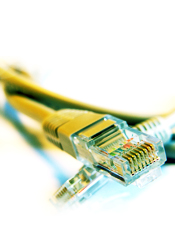Our role in connecting customers to a digitized society
 A recent Pew study found that 70% of American adults had a high speed Internet connection at home. Another 10% did not have a high speed connection at home but did have a smartphone. If we apply these findings to the entire US population, this means that 20% of American adults (some 47 million people) have "neither a home broadband connection nor a smartphone." With all public libraries offering free public Internet access and the overwhelming majority providing broadband access, libraries are uniquely positioned to connect everyone to the Internet.
A recent Pew study found that 70% of American adults had a high speed Internet connection at home. Another 10% did not have a high speed connection at home but did have a smartphone. If we apply these findings to the entire US population, this means that 20% of American adults (some 47 million people) have "neither a home broadband connection nor a smartphone." With all public libraries offering free public Internet access and the overwhelming majority providing broadband access, libraries are uniquely positioned to connect everyone to the Internet.
And not a moment too soon. A number of companies have moved their job application process online so someone who simply wants to be a housecleaner for a hotel must know how to:
- use a mouse
- use a keyboard
- use Windows
- connect to the Internet
- navigate Web sites
- fill out and submit online forms
- create and upload a resume
- create and use an email address
In addition to applying for jobs online, the process of applying for housing is often initiated online as is applying for SoonerCare, obtaining tax forms, filing for unemployment, and, in just 33 days, enrolling in the Health Insurance Marketplace. I see these opportunities as a chance for us to do what we do best: provide knowledgeable and timely service to enable our customers to "do what they set out to do and get on with their lives."
While most of us are not a designated public computer specialist, we are all designated customer service specialists. We provide help with everything from suggesting the next book to read to setting up an email account to giving directions to the bathroom. If libraries are to (continue to) adapt and survive, the mindset of "that's not part of my job" regarding help with an online task no longer applies (it has actually never applied). If we don't know how to help a customer, we're sure to know where to turn for help.
For a number of our customers, we are the only connection to a society that is increasingly requiring some level of digital literacy. If we don't embrace the growth of digital literacy for ourselves and our customers with the same passion we have always shown for "traditional" literacy, then we're doomed, both as an institution and an industry.
- Log in to post comments
